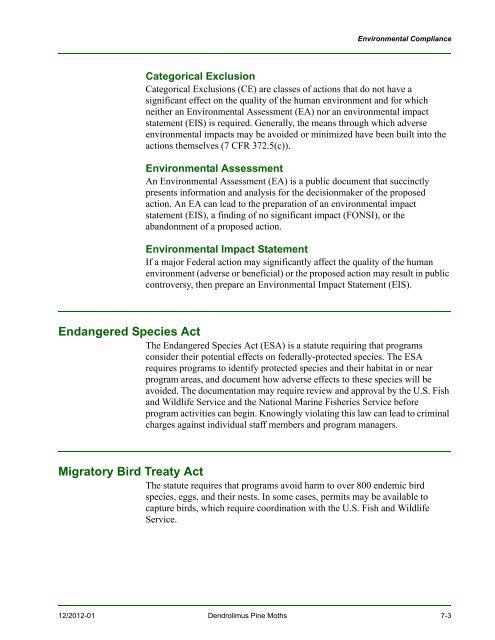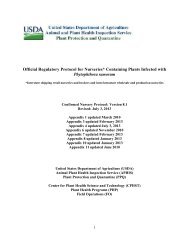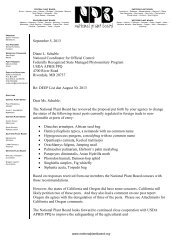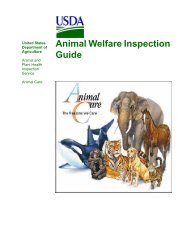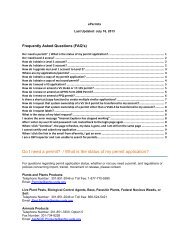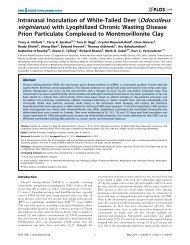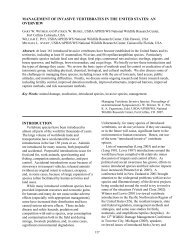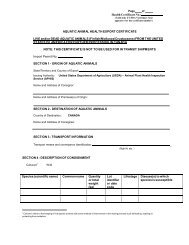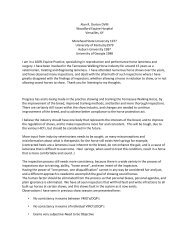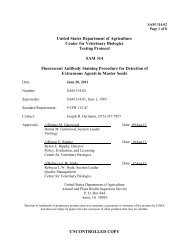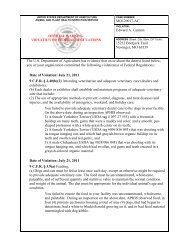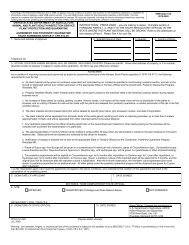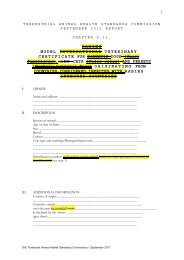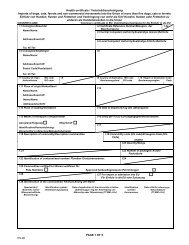New Pest Response Guidelines - aphis - US Department of Agriculture
New Pest Response Guidelines - aphis - US Department of Agriculture
New Pest Response Guidelines - aphis - US Department of Agriculture
You also want an ePaper? Increase the reach of your titles
YUMPU automatically turns print PDFs into web optimized ePapers that Google loves.
Environmental Compliance<br />
Categorical Exclusion<br />
Categorical Exclusions (CE) are classes <strong>of</strong> actions that do not have a<br />
significant effect on the quality <strong>of</strong> the human environment and for which<br />
neither an Environmental Assessment (EA) nor an environmental impact<br />
statement (EIS) is required. Generally, the means through which adverse<br />
environmental impacts may be avoided or minimized have been built into the<br />
actions themselves (7 CFR 372.5(c)).<br />
Environmental Assessment<br />
An Environmental Assessment (EA) is a public document that succinctly<br />
presents information and analysis for the decisionmaker <strong>of</strong> the proposed<br />
action. An EA can lead to the preparation <strong>of</strong> an environmental impact<br />
statement (EIS), a finding <strong>of</strong> no significant impact (FONSI), or the<br />
abandonment <strong>of</strong> a proposed action.<br />
Environmental Impact Statement<br />
If a major Federal action may significantly affect the quality <strong>of</strong> the human<br />
environment (adverse or beneficial) or the proposed action may result in public<br />
controversy, then prepare an Environmental Impact Statement (EIS).<br />
Endangered Species Act<br />
The Endangered Species Act (ESA) is a statute requiring that programs<br />
consider their potential effects on federally-protected species. The ESA<br />
requires programs to identify protected species and their habitat in or near<br />
program areas, and document how adverse effects to these species will be<br />
avoided. The documentation may require review and approval by the U.S. Fish<br />
and Wildlife Service and the National Marine Fisheries Service before<br />
program activities can begin. Knowingly violating this law can lead to criminal<br />
charges against individual staff members and program managers.<br />
Migratory Bird Treaty Act<br />
The statute requires that programs avoid harm to over 800 endemic bird<br />
species, eggs, and their nests. In some cases, permits may be available to<br />
capture birds, which require coordination with the U.S. Fish and Wildlife<br />
Service.<br />
12/2012-01 Dendrolimus Pine Moths 7-3


